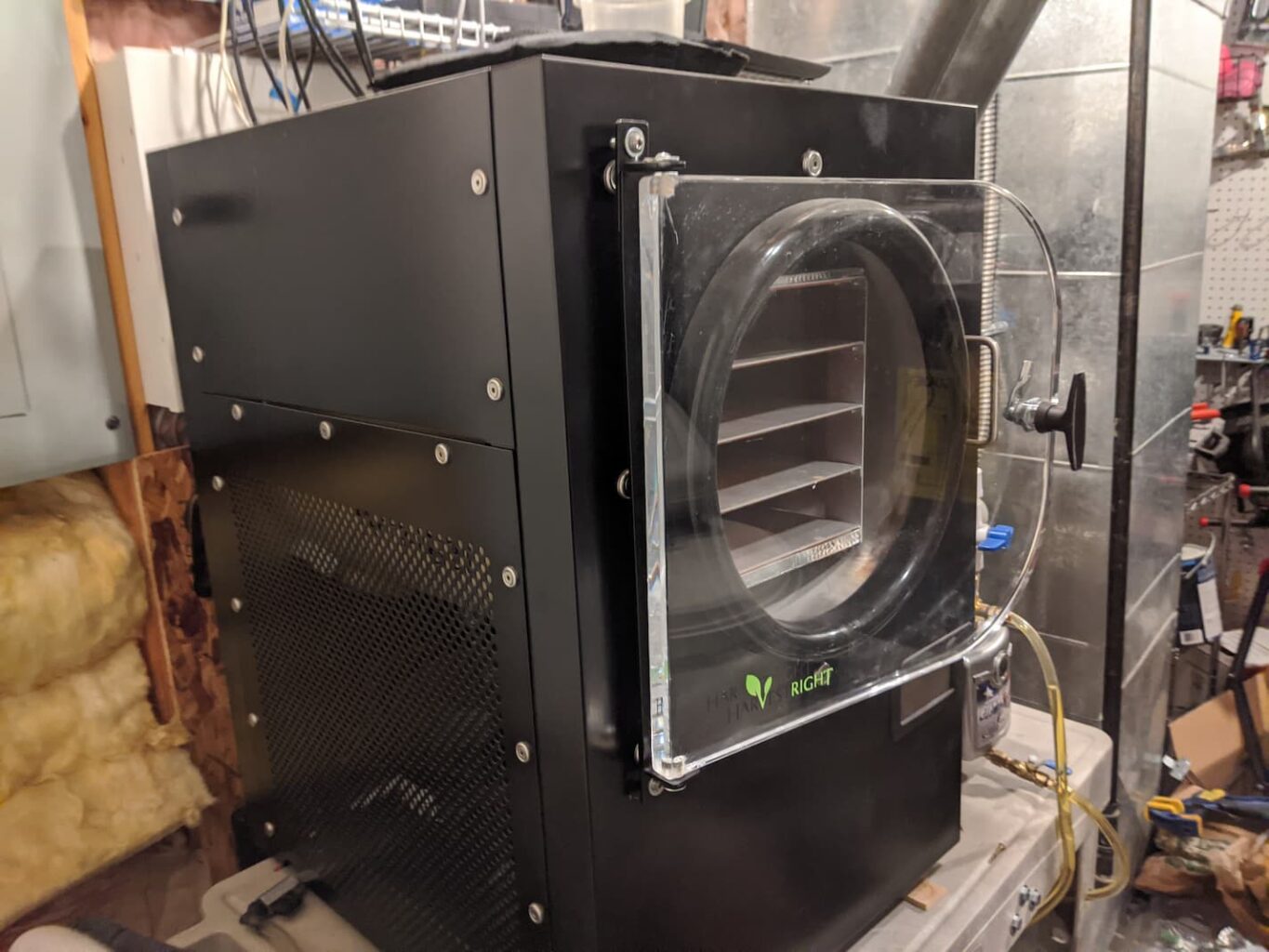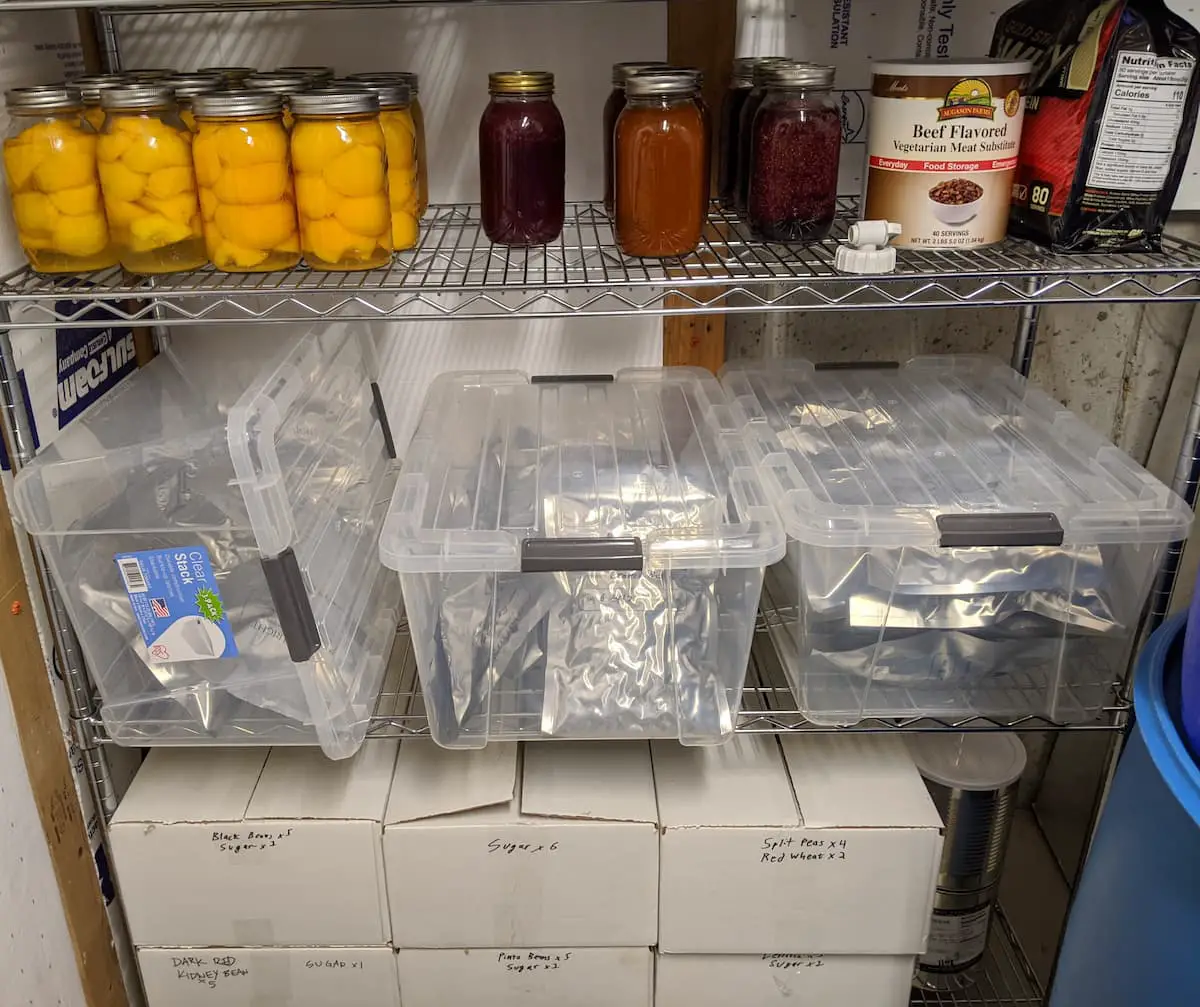Most people who decide to invest in freeze-dryers may wonder about running a home business with their freeze-dryer (along with personal use). The number of freeze-dried foods we can make is an excellent option to consider. Even so, can you make money with a freeze-dryer?
Anyone can make money with their home freeze-dryer by selling freeze-dried foods or renting out their unit. Someone considering a freeze-drying business should check local, state, and federal laws and get all required licenses. Also, check cottage industry laws (or home food processing laws).
So, let’s read on to learn everything we need to know about making money with our freeze-dryers.

How Much Money Can You Make with a Freeze-Dryer?
People can make as much money with a freeze-dryer as they want, depending on what they charge for services and goods. How much money can be made also depends on the freeze dryer’s size? A single, regular-sized freeze-dryer can make about $10,000 worth of food in a year per Harvest Right’s site.
My friends, who rent out space in their freeze-dryer, make enough money to cover running their freeze-dryer all year round. That’s their goal, so they don’t really try to make money beyond that. Once they’ve got their fees covered, they use the rest of the space and time for their own food storage needs.
On the other hand, I don’t rent out space in my freeze-dryer at all. I’ve also not tried selling any freeze-dried foods, but I’ll explain why later on in this article.
Note: Most people who want to go into business with their freeze-dryers opt for a larger-sized freeze-dryer (or they buy several freeze-dryers) to increase production.
A business like this could be a bright idea for someone who is into farming, or someone who has an amazing backyard garden.
Even if we decide not to go into business with our freeze-dryer and determine that we will only use the machine for personal needs, the freeze-dryer quickly pays for itself.
For example, if we have a family of four, the freeze-dryer can help us preserve 2-4 months of food in a year without going crazy. This way, no food gets wasted, and we don’t have to throw away leftovers and waste food.
Can I Freeze Dry Food and Sell it?
Selling homemade, freeze-dried foods is doable, especially if you adhere to applicable food handling, cottage industry, and business laws. The demand for easy, healthy food and snacks has been rising for the last couple of years, and freeze-dried foods fit that bill perfectly.
The number of people engaged in outdoor sports has also increased. Usually, people involved with these hobbies prefer portable, lightweight, and easy meals to get them through their activities. Therefore, freeze-dried goodies are some of the best options on the market.
Note: remind any potential customers to drink plenty of water so they don’t get backed up!
Parents also want their kids to enjoy healthier snacks. Not only are freeze-dried snacks healthy, but kids and adults enjoy these types of snacks. For example, have you ever tried freeze-dried yogurt? The flavor and sensation of eating these yummy snacks are amazing.
In addition, we can also supply freeze-dried food for pets. For example, people raising chickens usually want to add freeze-dried mealworms and crickets into their chickens’ diets. That link will take you to an article I wrote explaining the whole thing.
Another fun note: if local cottage industry rules won’t apply to you, look into selling pet-related freeze-dried foods. Those rules are usually less stringent than the ones for human food preparation. However, I always recommend having a clean kitchen, no matter who you’re preparing food for!
Further, people who own reptiles tend to depend on freeze-dried or dehydrated bugs over fresh ones.
Where Can I Sell Freeze-Dried Food?
The best places to sell homemade, freeze-dried foods are local areas such as farmer’s markets. Look for any other small, local markets where local business owners sell their products such as eggs, honey, and even beauty products. Please adhere to any applicable laws related to food or the market.
There are several areas and ways to sell freeze-dried goods. However, it depends on the laws of the place we live in if it’s allowed. So, it’s never wrong to check with our local, state, and federal governments on what is permitted and whether our business must meet any requirements before selling any products.
Here in my area, Utah State University has a farmer’s market. They have a basic requirement – we have to apply as a vendor. In the vendor application form, they outline what all needs to be filed, along with the rules set by the health department and state safety standards.
In other words, they make it really easy to figure out what I would need to do if I wanted to become a vendor. If you’ve got a local agricultural extension to a university, they’re a great place to start your search for a farmer’s market. They may also be able to walk you through getting everything squared away as USU has done for me.
If you don’t have a local agricultural extension, see if your state has a farmer’s market hub.
In Utah, there’s a website called Utah Farmers Market Network, which lists all farmer’s market locations in Utah. So, if we live there, we can easily find a farmers’ market near us to sell our goods. Your state may have something similar.
Or, go bigger for your first search. The U.S. Department of Agriculture has a page showing a wide range of local food directories for farmers’ markets. But usually, the area will have a small list we can quickly go through if we find a page for our area’s farmers’ market directory.
We can also try selling goods online. However, that’s a whole new level of permits and laws. Usually, the basic cottage food laws apply. Unless there’s interstate commerce because then there are interstate food rules and taxes to think about.
How Do I Start a Freeze-Dry Business?
Before starting a freeze-dryer business, check with applicable government entities and regulators to see what’s required to run a legal business. See if any licenses are required. Also, it’s a clever idea to check the local cottage food laws, which tend to differ depending on the area.
Here in the U.S., there are a few terms you need to know before you start any business, let alone a freeze-drying one.
- Food handling laws and regulations – these are the usual rules to ensure food is being handled safely for human consumption. You may need to take a class and pass a test to get a food handler’s permit.
- Business laws and regulations – these are the rules you’ll need to follow to start a business, even if it’s at home. Some areas require licenses, which may or may not require a location inspection.
- Any applicable rules, regulations, laws, and covenants – depending on where you live, your HOA, city/town/township, state, and the federal government may have applicable regulations you need to follow.
- Cottage industries – within the USA, “cottage industries” are allowed with less oversight than larger businesses. Ensure your state allows it and look up the specifics needed to acquire a permit.
Cottage food laws tend to change depending on the state. Therefore, we recommend googling each state’s regulations for the specific area before choosing this option.
While it changes from state to state, some basic laws remain the same. Let’s go into those.
- First, we need to prove that there is proper storage for the food, both cold and dry. Since we’re starting a freeze-drying business, ensure adequate storage for the frozen-dried products.
- Next, if there are any pets around, they generally can’t be allowed in the kitchen, although there is some exception to this depending on the cottage industry laws. Consider putting the freeze-dryer somewhere where the pets don’t have any access. Some people who keep freeze-dryers do their business operations in a basement kitchen instead of the main kitchen.
- People also need a state and/or city business license. Even applying to be a vendor in a farmers market requires a permit. Check with the local government regarding the requirements to apply. Usually, we can find the application form on the local government’s website.
- Plan to get a zoning clearance certificate and other permits required from the local government. The types of permits tend to change depending on the location of the kitchen.
- So, call the local government (or check their website, if they’re staying with the times) regarding the permits or check their websites to see if they have the list of permits and application forms needed.
- Usually, the local government requires a separate kitchen to produce food for business. However, states that allow cottage industries typically will enable the use of home kitchens for business, with some restrictions.
It’s best to allow the health department to regularly inspect the kitchen for health and safety. Some cottage laws require a yearly health inspection, but other states may need more. Other areas don’t require any inspections, but getting them may help prevent issues in the future.
Also, when applying to sell in a farmer’s market, sometimes they may require an additional health inspection.
If the health department can routinely check up on the kitchen and inspect all documents, you should be fine.

Can I Rent Out My Freeze Dryer to Make Money?
Renting a freeze-dryer for cash isn’t the most common way to make money, but people do rent out their freeze-dryers, usually from their homes. Permits may be required, as may an industrial-rated kitchen unless cottage industry laws exempt you. Make sure to put the ads out there for everyone to see.
Many people tend to either buy freeze-dried goods or rent a freeze-dryer since they don’t want to commit to the maintenance of owning one. So, this is another promising idea for how to make money. However, be prepared for the upkeep of renting out a freeze-dryer.
Another thing that we should consider is where to keep the freeze-dryer. Due to the generous size of a freeze-dryer, it isn’t exactly portable. Renters will have to go wherever the freeze-dryer is.
It’s an excellent option to keep the freeze-dryer in a separate (but climate-controlled) shed or a part of the house that is unoccupied.
This way, renters and household members will not bump into each other. It’s a better option than keeping a freeze-dryer in the kitchen. Renters would also appreciate the privacy when they enter the area to freeze-dry their food.
After all, if you’ve got that basement kitchen already set up for your cottage industry making and selling freeze-dried foods, why not rent the whole thing out? If it’s allowed, anyway.
There’s obviously a ton more detail than this, but it’s enough that I wrote a whole other article on it over here, although from a renter’s perspective: Can You Rent a Freeze-Dryer? Things to Know!
How much should I charge to rent out my freeze-dryer?
For a medium-size freeze-dryer, it’s not unheard of to charge $550 a week, but there are better options for customers. For example, private owners usually rent out trays in a load for $5 a tray, and for the entire machine, the renter pays $60 for a full load.
It’s up to the owner to let their customers know that they will provide containers, or they can sell them to make extra cash.
Depending on how many trays the customer needs, some people rent out portions of their freeze-dryer. This way, the owner can use the remaining trays for their food.
One good thing about being a private owner is that we can negotiate a price based on the customer’s needs. For example, we may want to adjust the cost depending on the type of products, the amount they wish to freeze-dry, and how long the load takes (to account for energy costs).
If I were going to rent out my freeze-dryer, I’d probably charge $5 to $7 a tray per load, $25 for the whole machine, or $50 to $75 per load (depending on how long it takes).
However, I’d probably also throw in any Mylar bags and help impact seal the bags shut to sweeten the deal. After all, that would cover all of my costs – so it’d probably be the friends and family pricing.
How Much Money Can I Make Selling Freeze-Dried Goods?
The price of freeze-dried goods sold depends on the product, quantity, and packaging. 500 grams of freeze-dried food can cost around $20. Freeze-dried candies can cost $10 or more. Consider all of the production costs when setting a price.
Animal treats also cost about $20 if freeze-dried. Also, look at the type of treats that are selling. For example, freeze-dried dog biscuits and crickets will differ in price. Usually, we can price them in the $10-$20 range.
We can visit Etsy or Amazon to get an idea of how to price our products.
My personal rule of thumb is to keep anything I sell in person below or in line with anything sold in stores or online, provided that the cost covers production and maintenance fees, along with a little extra (there are always extra costs that pop up).
That way, customers would feel like they’re getting a great deal and better quality products than they could get elsewhere. That’s a recipe for happy customers who are loyal and willing to come back – and that’s worth way more than an extra few bucks in your pocket right now (especially if it comes with sour feedback in the future over the cost!).

What Freeze-Dried Goods are Saleable?
Almost any food that is freeze-dried is saleable locally or in a farmer’s market, as long as it follows their guidelines. Check with them to see what foods are allowed to be sold. Foods sold online or sent via the mail fall under federal guidelines, and may require testing and nutritional labels.
Usually, people enjoy freeze-dried fruits and vegetables for the health benefits they pack. However, they also worry that bulk buying of these foods will go bad if not consumed immediately.
Giving them a freeze-dried option is a fantastic way to buy whatever amount they want without worrying about spoilage.
There’s also a market for freeze-dried animal treats and food. Of course, freeze-dried insects are the usual things that reptiles and chicken owners want to use. If planning on catering to these animals, we can raise our insects.
It’s surprising how much produce we can create with a dedicated insect farm.
Pet owners have also been looking into freeze-dried dog food treats. Handling the food mixture is tricky, but since there aren’t many on the market, this might be our chance to make it big.
Again, if you’re wanting to get into selling foods online and/or mailing them anywhere, please be aware that you will also need to conform to federal guidelines as outlined by the FDA and Department of Agriculture.
How Should I Pack the Freeze-Dried Food That I Sell?
Check the local farmer’s market regarding their guidelines for packaging. Follow the fundamentals of freeze-drying for extended storage (protect from air, water, and light). The chances of people storing their food in the package are high. Mylar bags are a safe option.
We can be creative with packaging by ordering custom-made vacuum-sealed Mylar Bags with your brand label on them. Another option is to use uniform, air-tight mason jars with a sticker label on the outside of the jar.
I’ve seen people who sell their freeze-dried goods in Mylar bags with windows in them so that the product is visible. I’ve also seen people selling freeze-dried goods in regular Ziploc bags, though I wouldn’t recommend that option, as it doesn’t protect the food from light degradation.

Key Takeaways and Next Steps
It is more than possible to make money from your freeze-dryer. However, there is a lot of behind-the-scenes stuff that absolutely has to be squared away before you dive into it.
After all, it’s far better to be prepared and know what your options are in advance than to get stuck with an unexpected fine for not following the very publicly posted regulations.
Personally, I don’t choose to monetize my freeze dryer by renting it or selling any foods. The cottage industry laws in my area prohibit pets from being in the kitchen, and there’s no way I can do that. I only have one kitchen, and we keep our freeze-dryer in the utility room. It’s perfectly safe, but I can see how a customer would perceive that as problematic.
So, I don’t sell anything we make. We keep anything we freeze-dry for our personal food storage, or we give it to friends and family.
Now, if you’re in a similar situation, or you just want more ideas on how to make money as a homesteader, be sure to read this article I wrote: How to Make Money with a Few Acres of Land: Complete Guide.
Or if you’d rather go read more about freeze-drying, be sure to check out this important piece of classic information: How to Freeze-dry Milk (Goat, Cow, Sheep, Human, Nut).
Resources
Learning from your own experience is essential, but learning from others is also intelligent. These are the sources used in this article and our research to be more informed as homesteaders.
- “Find a Farmers Market.” Utah Farmers Market Network, www.utahfarmersmarketnetwork.org/find-a-farmers-market. Accessed 9 June 2022.
- Harvest Right Freeze Dryer Rental, Rent Harvest Right Freeze Dryer Rental in Redwood City, Menlo Park, Palo Alto, San Mateo, San Francisco, Santa Clara.” Harvest Right Freeze Dryer Rentals, www.aaarentals.com/equipment.asp?action=category&category=64&key=FREEZEDRYER. Accessed 9 June 2022.
- “Local Food Directories: National Farmers Market Directory | Agricultural Marketing Service.” Local Food Directories, www.ams.usda.gov/local-food-directories/farmersmarkets. Accessed 9 June 2022.
- “Renting a Freeze Dryer.” Reddit, 12 Nov. 2021, www.reddit.com/r/HarvestRight/comments/qs6ip0/renting_a_freeze_dryer.
- Right, Harvest. “Freeze Dryer Quickly Pays for Itself.” Harvest Right⢠| Home Freeze Dryers | Freeze Dried Food Storage, 1 Sept. 2020, harvestright.com/blog/2017/freeze-dryer-quickly-pays-for-itself.
